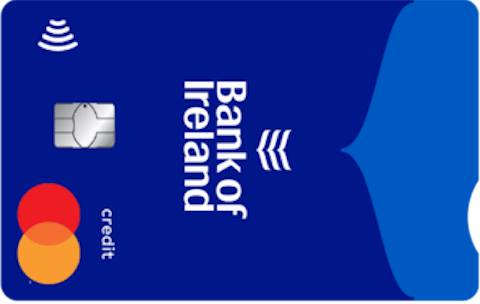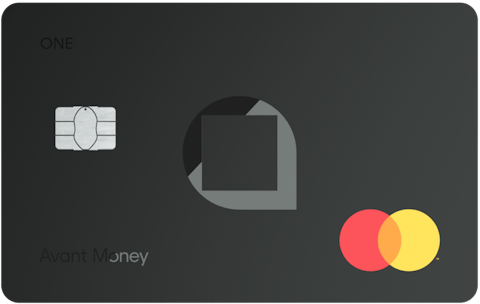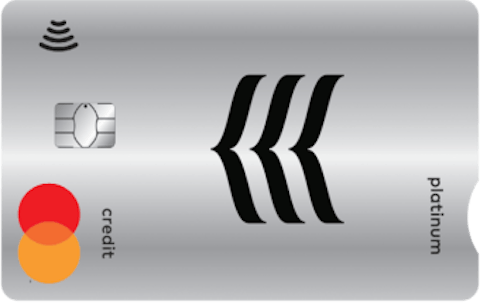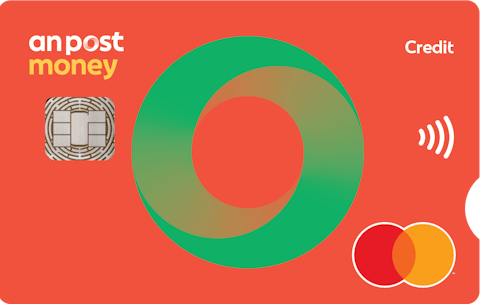Longest 0% purchases card
Why we like this card
This is currently Ireland’s longest 0% purchase rate deal. With nine months to pay off your purchases with no interest, it’s hard to fault the Flex credit card from An Post.
Also, benefit from fee-free transfers so you can transfer money from your credit card to your current account when needed. The purchase interest rate will apply to money transfers.
Pros
- You’ll get a lengthy 9 months with 0% interest on purchases
- Fee-free money transfers from your credit card to your current account
- The lowest typical APR (Annual Percentage Rate) once the introductory offer ends
- View balances and transactions with the An Post Credit Card app
Cons
- You’ll need to pay off the balance on all purchases within the introductory offer period
The bottom line
It’s the best 0% purchase card offer in Ireland, with a long 0% interest period, one of the lowest typical APRs and fee-free money transfers for flexible spending.
Best 0% purchase card for everyday spending

Why we like this card
Whether you’re shopping online, paying bills or planning to make a big purchase, the Classic Credit Card from the Bank of Ireland is a great card to make those interest free purchases.
This card has one of the longest 0% periods and lowest APRs (Annual Percentage Rate), so you’ll pay less for your credit when your interest-free period is up.
If you need to make a large purchase of €250 or more after your interest free period has ended, the Instalment Plan lets you transfer your credit card purchase onto a rate of 6.7% variable (6.9% APR) and pay off the debt in monthly instalments.
Simply phone your bank before your next monthly payment is due and let them know which item you want to pay on an instalment plan.
Pros
- You’ll get 6 months to shop without paying interest
- Make quick and safe contactless payments with Apple or Google Pay
- There’s a low interest instalment option for larger purchases
- As a MasterCard customer you’ll get exclusive offers and travel perks.
Cons
- You’ll have to choose between the 0% balance transfer and 0% purchase offer
The bottom line
It’s the perfect spending partner for everyday purchases and life’s little luxuries.
Best all around 0% purchase card

Why we like this card
The Avant Money One Card not only offers 0% on purchases for 3 months, you’ll get a 0% balance transfer period of 9 months and a 0% money transfer for any purpose.
You’ll also earn rewards on your spending through the Avant Avantages® loyalty programme, giving you discounts and rewards at hundreds of Ireland’s top brands.
The 0% money transfer could allow you to transfer money to your current account to pay for purchases, interest-free for 12 months, a bit like a 0% loan.
When you have completed a balance transfer of at least €1,000 within 90 days of account opening, Avant Money will credit €150 cashback to your account within 6 months of account opening.
If you want to clear your debt on another credit card, the 0% balance transfer card will allow you to transfer the debt and pay 0% interest on it for 9 months. G
Find out more about balance and money transfers on Ireland’s best 0% balance transfer cards.
Pros
- Reduce your debts with 0% balance transfer for 9 months
- Get €150 cashback on a balance transfer of €1,000 and over
- You’ll get 0% purchases for 3 months
- Benefit from 0% money transfer for 12 months
- Enjoy the Avantages® loyalty programme for access to over 300 offers
Cons
- It’s got one of the highest annual percentage rates (APRs) once the discount ends
- You’ll need to complete transactions within the first 90 days to avail of the offers
- €150 cashback on One Card subject to a balance transfer of at least €1,000 within 90 days of account opening
The bottom line
A great all-rounder for purchases and managing existing debt. It’s the ideal option for those confident with credit.
Best 0% purchase card for travel

Why we like this card
Not only does the Platinum Credit Card have one of the longest 0% interest rate periods, but it also has one of the lowest APRs of all the 0% credit cards we viewed and a great travel perk for frequent flyers.
If you’re planning to make big purchases, the long 0% interest period and subsequent low APR means your credit goes further for longer.
The free multi-trip travel insurance is a handy benefit too. You’ll get comprehensive travel cover including winter sports every time you use your card to pay for at least half of your trip abroad.
Pros
- It’s got one of the longest interest-free purchase period in Ireland
- Benefit from a low APR once your introductory period ends
- Spread the cost of large purchases at a low rate with an Instalment Plan
- Enjoy free travel insurance
Cons
- You’ll need to earn €40,000 per year to qualify
- There’s an annual charge of €76.18
The bottom line
A great credit card for big spenders who want to keep their credit balance small.
Your guide to 0% purchase cards
Get a credit card with a 0% rate, and spread the cost of purchases without paying interest.
Get the most from your 0% purchase card
Interest-free credit cards are also known as 0% purchase cards. They allow you to go shopping or spend on entertainment and services without paying any interest for a limited period. The 0% usually lasts between one and 12 months.
Once the introductory interest-free period ends, you’ll start to pay the standard variable interest rate and your monthly repayments will rise.
You will have to make the minimum monthly payment each month so check what this will be and make sure you can afford to meet at least the minimum payment, before spending on your card.
To get the most from your 0% purchase card, make sure you pay off what you have borrowed before the introductory period ends so you don’t end up paying the higher rate of interest on the outstanding balance.
Your card in action
If you spend €1,000 on your credit card with an APR of 20% and you pay back €90 per month it would take 13 months and cost you an extra €115 in interest, but with an introductory rate of 0% APR for 6 months (reverting to 20% APR thereafter) it would take 12 months to pay off the balance and cost you €25.
How to pick the best 0% purchase card
Although it’s tempting just to take out a credit card with your bank, it often pays to shop around to see what other providers have to offer.
After weighing up the features, you may find that one card is better suited to your spending habits, so before you pick a card think about:
- What are you most likely to use the card on - shopping, services or paying bills?
- Will you use it to make one major purchase or many small purchases over time?
- Can you afford to pay off the balance when the discount ends?
So, if you shop frequently and pay off your balance in full most months a purchase card with cashback may be best.
However, if you’re making a large purchase and are unlikely to settle the balance by the time the 0% offer ends, a card with a long introductory period and a low APR may be better.
Compare these features when picking an interest-free card:
- Introductory interest rate - this is a discounted rate set for a fixed time, usually 0%. This means you’ll pay no interest on purchases during the introductory offer period which is between one and six months in Ireland.
- Typical APR - this is the official rate used for comparing credit cards and loans and includes the standard rate of interest plus other costs associated with your credit such as Government Stamp Duty or annual fees.
- Standard variable interest rate- this is the interest rate your card returns to after the interest-free period ends. It’s the rate you’ll pay on all purchases once the introductory period ends.
- Bank charges - you’ll have to pay fees for things like late payment, cash advances or missed payments. Some rewards cards also charge an annual fee, so check the small print before applying because it’s often hidden away.
- Rewards and cashback - for frequent shoppers cards with cashback, travel rewards or exclusive discounts are popular but you may have to pay an annual fee and there can be hidden catches. If you don’t use your card often or travel frequently they’re probably not worth it.
- Salary requirements - most cards require you to have a salary of at least €16,000 per year with some requiring up to €40,000. Student credit cards don’t have salary requirements.
Features you’ll get with your 0% credit card
These features often come as standard with your credit card:
- No transaction fees when you pay for goods and services in Ireland
- Fraud protection and secure online shopping
- Contactless payments on your mobile with Apple and Google Pay
- 56 days interest free credit when you pay off your balance in full each month
- Low cost instalment plans with low interest for large purchases
- Free additional cardholders, often up to 3 extra people
Is there a spending limit on a credit card?
Yes, you’ll be given a credit limit. Your credit limit is the maximum amount you can borrow on your credit card at any one time.
For example, if your credit limit is €5,000 you can owe up to that amount on your card at any time before incurring extra charges.
When you apply for a credit card you may get an indication of your credit limit eligibility but you won’t necessarily get the amount you requested. You’ll only find out your actual credit limit when your application has been approved.
How is your credit limit calculated?
When you apply for a credit card, your credit history will be checked to work out what your credit limit should be and the interest rate once the 0% rate has ended.
Credit limits are also based on other factors including:
- Income and outgoings, like salary and rent
- Existing credit commitments, like loans or other credit cards
- Past credit performance
Check your credit report for your financial history and repayment records and learn more about how banks and card issuers use your credit report to set your credit limit and interest rate.
0% purchase card alternatives
If you need to borrow money to make a big purchase or to cover times when you are short of cash, like the end of the month or towards Christmas a line of credit can often come in handy. Here’s a couple of other options worth exploring.
Loans
A loan is worth considering if you want to make a one-off, large purchase like a car or holiday. You can usually borrow between €1000 and €25,000 and make monthly repayments at a fixed interest rate over an agreed period.
The lowest interest loans in Ireland are typically around 7% APR, but for an up-to-date full comparison of loans in Ireland visit Switcher.ie.
The advantage of a loan is that interest and monthly payments are fixed at the start of the loan, but you won’t get a 0% introductory period, and you’ll have less flexibility and control over your repayments
Overdrafts
An overdraft lets you withdraw money or pay bills from your current account even if your balance is zero. It is a form of short term credit that your bank may authorise so you can deal with temporary cash shortfalls.
It’s not a good idea to rely on your overdraft for credit even if it’s agreed upon because interest rates are typically over 12% and you will also have to pay a fee.
Visit Switcher.ie if you want to know more about current accounts and overdraft fees.
Buy Now Pay Later (BNPL)
Buy Now Pay Later helps you spread the cost of borrowing and is increasingly being offered as a way to pay for goods and services online.
It works by allowing you to split the cost of purchases into smaller payments without paying interest. Credit decisions are usually instant, and you can complete payment for your shopping as you would with a debit card, credit card or Paypal.
The advantage of BNPL is that if you pay for your purchases within the agreed time, you can spread the costs without paying extra interest; however, if you don’t clear the credit on time, you may be stumped with late fees and high interest rates on the remaining balance.
Which is best?
If you pay off your balance within the 0% interest period on a credit card, then a card is the cheapest and most flexible way to get credit, plus you could benefit from cashback and rewards.
How to apply for a 0% purchase card
To qualify for a 0% purchase card in Ireland you may have to complete an eligibility check before you apply. This can be a helpful step because it gives you a clue about what your credit limit could be and the likelihood of approval.
For the full application, you’ll need to provide personal and financial information, including your PPSN. The card issuer is required by law to obtain evidence of your credit history from the Central Credit Register.
To get approved you’ll need to fulfil the bank’s lending criteria and have a good credit history. Lending criteria will differ between banks, but most will require that you are:
- over 18 years of age
- a permanent resident of the Republic of Ireland
- earning over €16,000 per year
This month’s 0% credit cards deals at a glance
Before you go ahead and apply, it’s worth shopping around to see what’s on offer. Here’s the latest deals ranked by discount period.
| Introductory Interest Rate | Typical APR | |
|---|---|---|
| An Post Flex credit card | 0% for 9 Months | 15.7% |
| Bank of Ireland Platinum Advantage | 0% for 6 Months | 19.6% |
| Bank of Ireland Classic | 0% for 6 Months | 22.1% |
| Bank of Ireland Aer Credit Card | 0% for 6 Months | 22.7% |
| Bank of Ireland Student | 0% for 6 Months | 20.2% |
| Revolut Credit Card | 0% for 3 Months | 17.99% |
| PTSB ICE Visa Credit Card | 0% for 3 Months | 22.53% |
| Avant Money One Card | 0% for 3 Months | 22.9% |
0% purchase card FAQs
Can I use Apple Pay or Google Pay with a credit card?
Yes, Avant Money, AIB, An Post, Bank Of Ireland, PTSB and Revolut all allow you to set Apple or Google Pay on your phone.
Can I withdraw cash on my 0% purchase card?
Yes, but avoid using your credit card for cash withdrawals if you can, as they won’t be eligible for the 0% rate. You’ll have to pay a withdrawal charge and get charged a daily interest fee.
What happens if I can't make my repayments?
If you can’t keep up with your minimum monthly repayments or exceed the credit limit on your card, you could risk losing the 0% rate and revert to the standard interest rate. This will make your monthly payments more expensive.
What is the minimum repayment?
It’s the minimum amount you must pay towards your credit card balance each month.
Ideally, you should pay off your balance in full each month to avoid interest charges, but if that’s not possible, you must make a minimum repayment every month.
If you don’t, you risk paying a penalty, owing extra interest and harming your credit score.
Can I get more than one 0% credit card?
Yes, if you have a good credit history, there is no reason why you can’t have more than one credit card. In fact, some people will have one credit card to help them clear their outstanding balances and one to shop with that has cashback or rewards.
However, you’ll need to pay the Government Stamp Duty of €30 on each credit card account you hold.
If you have a poor credit score, it will be harder to get more credit because the card issuer will access the Central Credit Register Credit to assess your credit history.
What does Typical APR mean?
The annual percentage rate (APR) is the official rate used for comparing credit cards and other types of credit like mortgages and loans. The APR takes into account the standard interest rate and additional charges like the Government Stamp Duty, but not penalties, like late payment fees.
The lower the APR, the cheaper the cost of borrowing should be. A Typical APR is an average rate offered to the majority of borrowers.
